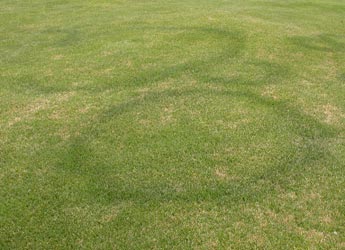Fairy Ring

Fairy Rings often appear in turf as irregular circular patches or arcs of lush dark green turf or sometimes brown/dead turf. Rings vary in size from a few inches to 200 feet or more and become larger each year depending on prevailing soil and weather conditions. The soil organisms that cause fairy rings are one of 60 or more species of fungi. These fungi are part of the mushroom family, basidomycetes, which colonize thatch and feed on decaying organic matter and do not directly attack turfgrass plants. Normally fairy rings are a nuisance and merely detract from the overall uniformity of the turf area. Three types of fairy rings are recognized: Type I, which badly damage or kill grass, Type II which stimulate grass growth, forming rings of lush, dark green turf, and Type III which do not stimulate grass, cause no damage, but produce mushroom rings.
Occurrence
Fairy rings occur throughout the United States under all soil conditions in all turf species. The rings are most visible in unirrigated, unfertilized areas where the soil contains decomposing organic matter. Warm, moist weather with intermittent periods of summer drought stress exacerbate the symptoms. In lawns it is common to have one in areas that were once occupied by trees and portions of the stumps or lumber have been buried and remain underground. Type I fairy rings are the most devastating and kill the turf by causing the soil to become water repellant which prevents rain or irrigation to enter the soil and the plants eventually die due to drought stress. The soil becomes water repellant because the fungal mycelium accumulates in such large quantities, plugging soil pore space.
Non-Chemical Control
Type II and III fairy rings rarely cause lasting damage to turf and suppression or masking the symptoms is the most effective approach to their control. This involves making sure the area affected has adequate nitrogen fertilization and irrigation throughout the year to mask the symptoms. Type I fairy rings that make soils water repellant are more difficult to control. Any practice that improves water movement into the soil, like deep core cultivation, may help alleviate the symptoms. To eradicate these fairy rings, however, all the affected soil needs to be carefully excavated and discarded. Soil needs to be removed to a 12 inch depth and at least 2 feet beyond the outermost evidence of the ring area. The remaining area needs to be filled with fresh uncontaminated soil and the area should be reseeded or sodded.
Chemical Control
Chemical control attempts have been largely unsuccessful. As mentioned earlier, applying sufficient nitrogen and irrigation at the appropriate times of year will help mask the symptoms. Other products like chemical soil surfactants combined with deep soil core cultivation in the affected area will help improve water penetration. Fungicide control has been largely unsuccessful due to the overwhelming quantity of fungal mycelium that is decomposing the soil organic matter.



